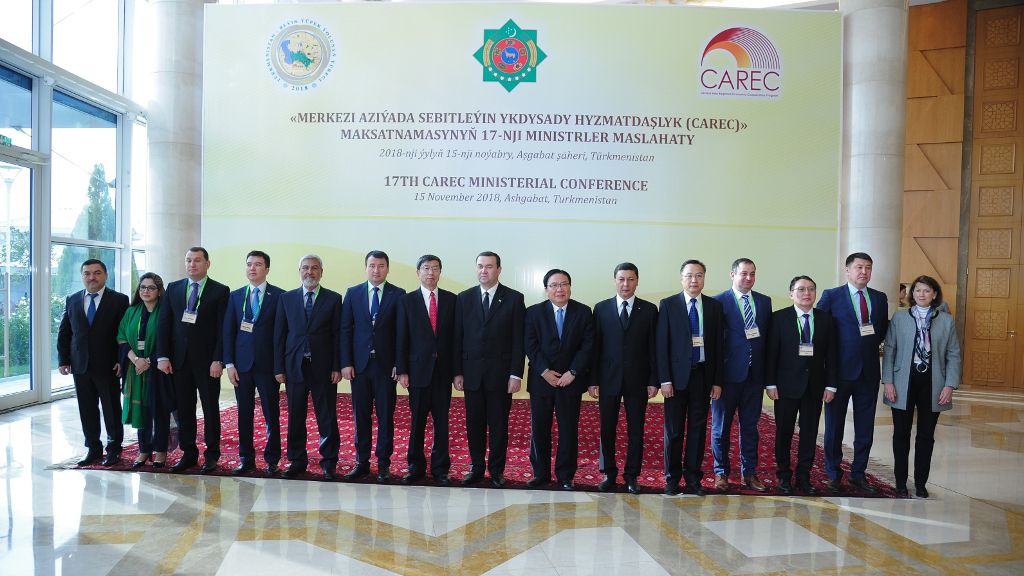News block
ADB President Reaffirms Support to Central Asia Regional Economic Cooperation at 17th Ministerial Conference
ASHGABAT, TURKMENISTAN (15 November 2018) — Finance ministers and senior government officials from 11 countries in Central and West Asia gathered in Ashgabat today for the 17th Central Asia Regional Economic Cooperation (CAREC) Ministerial Conference. The high-level strategy and policy body serves as a platform to discuss and debate important issues of regional relevance.

The Deputy Chairman of the Cabinet of Ministers of Turkmenistan Mr. Gochmyrat Myradov chaired the conference and committed Turkmenistan’s support to strengthening economic cooperation in the region. Asian Development Bank (ADB) President Mr. Takehiko Nakao delivered the special address. The meeting was co-chaired by ADB Vice-President Mr. Wencai Zhang.
In his remarks, Mr. Nakao reaffirmed ADB’s support for CAREC and announced $2 billion in new assistance for regional projects in CAREC countries in 2018. The funding is the start of $5 billion in financial support over 2018–2022 that ADB committed last year to support the CAREC 2030 strategy. The new assistance “will be dedicated to regional cooperation projects to improve connectivity, promote electricity exports, and strengthen trade facilitation," said Mr. Nakao.
This year’s conference focused on expanding regional trade and promoting economic diversification. CAREC ministers unanimously endorsed the CAREC Integrated Trade Agenda (CITA) 2030 and its Rolling Strategic Action Plan (RSAP) 2018–2030. CITA will help CAREC countries expand trade, diversify exports, and integrate with the global economy. The CAREC ministers said in a joint statement: “We resolved to create an open, free, and non-discriminatory trading environment, support a multilateral trading system, and oppose all forms of protectionism.”
In his remarks, Mr. Nakao said that the CAREC region’s economic outlook had strengthened and a recovery of trade volumes was underway. Strengthening ties among CAREC neighboring countries and the improving environment for economic cooperation will boost trade prospects in the region, he said.
The CAREC ministers commended the progress made in advancing the five operational clusters of the CAREC 2030 strategy, including (i) economic and financial stability; (ii) trade, tourism, and economic corridors; (iii) infrastructure and connectivity; (iv) agriculture and water; and (v) human development.
Ministers welcomed the first CAREC High-level Forum on Macroeconomic Policies for Economic and Financial Stability, and urged the continuation of such dialogue to strengthen economic cooperation in the region. Ministers supported the ongoing scoping study on exploring tourism promotion and cooperation opportunities and called for intensified efforts to capitalize on the tourism potential of the region. Ministers also welcomed ADB technical assistance to assess the economic potential of a new economic corridor among Kazakhstan, Tajikistan, and Uzbekistan, and noted the progress on the Almaty-Bishkek economic corridor.
Ministers noted the importance of the aviation study completed to identify joint activities for further cooperation in this area, and endorsed a high-technology roadmap to guide member states on the adoption of new energy technologies. They also appreciated the efforts to promote regional horticulture trade and the initiative to set up a CAREC Food Safety Network for sharing food safety related information. Finally, the ministers welcomed the initiation of a scoping study on opportunities for regional cooperation in higher education and skills development.
ADB is the secretariat of the CAREC program. Since 2001, the CAREC Program has financed 190 regional projects worth $32.9 billion in the areas of transport, energy, and trade in its member countries. Over a third of this amount, or $11.9 billion, has been financed by ADB; $13.4 billion by other development partners such as the World Bank, the Islamic Development Bank, and the European Bank for Reconstruction and Development; and $7.6 billion from CAREC governments. The 11 members of CAREC are Afghanistan, Azerbaijan, the People’s Republic of China, Georgia, Kazakhstan, the Kyrgyz Republic, Mongolia, Pakistan, Tajikistan, Turkmenistan, and Uzbekistan.
ADB is committed to achieving a prosperous, inclusive, resilient, and sustainable Asia and the Pacific, while sustaining its efforts to eradicate extreme poverty. Established in 1966, it is owned by 67 members—48 from the region. In 2017, ADB operations totaled $32.2 billion, including $11.9 billion in cofinancing.
(PHOTO CAPTION) From left to right: Tajikistan Ambassador to Turkmenistan Mr. Farrukh Sharifzoda; Pakistan Ministry of Commerce Parliamentary Secretary Ms. Shandana Gulzar Khan; Azerbaijan Deputy Minister of Economy Mr. Sahib Mammadov; Kazakhstan First Vice Minister of National Economy First Vice Minister Mr. Ruslan Dalenov; Afghanistan Minister of Agriculture, Irrigation, and Livestock Mr. Nasir Ahmad Durrani; Uzbekistan Minister for Foreign Trade Mr. Jamshid Khodjaev; ADB President Mr. Takehiko Nakao; Turkmenistan Deputy Chairman of the Cabinet of Ministers Mr. Gochmyrat Myradov; ADB Vice-President Mr. Wencai Zhang; Turkmenistan Minister of Finance and Economy Mr. Batyr Bazarov; People's Republic of China Vice Minister of Finance Mr. Yu Weiping; Georgia Deputy Minister of Economy and Sustainable Development Mr. Akaki Saghirashvili; Mongolia Ministry of Finance State Secretary Mr. Narantsogt Sanjaasuren; Kyrgyz Republic Ministry of Economy's Director of the Aid Strategy Department Mr. Sultan Akhmatov; and EBRD Vice President (Risk and Compliance) and Chief Risk Officer Ms. Betsy Nelson.